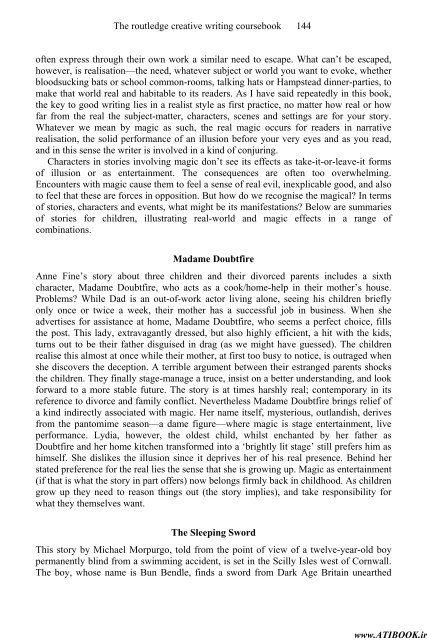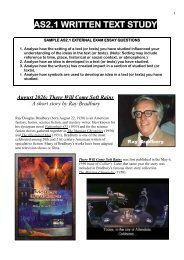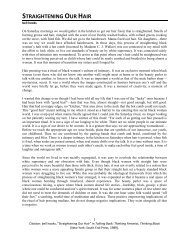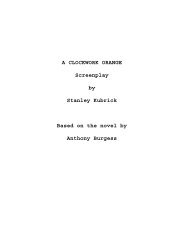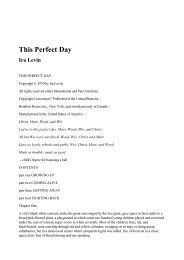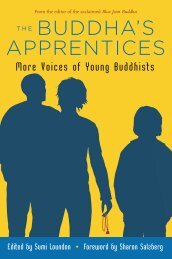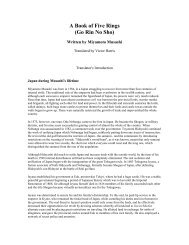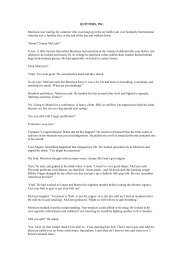9780415317856_the_routledge_creative_writing_coursebook
9780415317856_the_routledge_creative_writing_coursebook
9780415317856_the_routledge_creative_writing_coursebook
You also want an ePaper? Increase the reach of your titles
YUMPU automatically turns print PDFs into web optimized ePapers that Google loves.
www.ATIBOOK.irThe <strong>routledge</strong> <strong>creative</strong> <strong>writing</strong> <strong>coursebook</strong> 144often express through <strong>the</strong>ir own work a similar need to escape. What can’t be escaped,however, is realisation—<strong>the</strong> need, whatever subject or world you want to evoke, whe<strong>the</strong>rbloodsucking bats or school common-rooms, talking hats or Hampstead dinner-parties, tomake that world real and habitable to its readers. As I have said repeatedly in this book,<strong>the</strong> key to good <strong>writing</strong> lies in a realist style as first practice, no matter how real or howfar from <strong>the</strong> real <strong>the</strong> subject-matter, characters, scenes and settings are for your story.Whatever we mean by magic as such, <strong>the</strong> real magic occurs for readers in narrativerealisation, <strong>the</strong> solid performance of an illusion before your very eyes and as you read,and in this sense <strong>the</strong> writer is involved in a kind of conjuring.Characters in stories involving magic don’t see its effects as take-it-or-leave-it formsof illusion or as entertainment. The consequences are often too overwhelming.Encounters with magic cause <strong>the</strong>m to feel a sense of real evil, inexplicable good, and alsoto feel that <strong>the</strong>se are forces in opposition. But how do we recognise <strong>the</strong> magical? In termsof stories, characters and events, what might be its manifestations? Below are summariesof stories for children, illustrating real-world and magic effects in a range ofcombinations.Madame DoubtfireAnne Fine’s story about three children and <strong>the</strong>ir divorced parents includes a sixthcharacter, Madame Doubtfire, who acts as a cook/home-help in <strong>the</strong>ir mo<strong>the</strong>r’s house.Problems? While Dad is an out-of-work actor living alone, seeing his children brieflyonly once or twice a week, <strong>the</strong>ir mo<strong>the</strong>r has a successful job in business. When sheadvertises for assistance at home, Madame Doubtfire, who seems a perfect choice, fills<strong>the</strong> post. This lady, extravagantly dressed, but also highly efficient, a hit with <strong>the</strong> kids,turns out to be <strong>the</strong>ir fa<strong>the</strong>r disguised in drag (as we might have guessed). The childrenrealise this almost at once while <strong>the</strong>ir mo<strong>the</strong>r, at first too busy to notice, is outraged whenshe discovers <strong>the</strong> deception. A terrible argument between <strong>the</strong>ir estranged parents shocks<strong>the</strong> children. They finally stage-manage a truce, insist on a better understanding, and lookforward to a more stable future. The story is at times harshly real; contemporary in itsreference to divorce and family conflict. Never<strong>the</strong>less Madame Doubtfire brings relief ofa kind indirectly associated with magic. Her name itself, mysterious, outlandish, derivesfrom <strong>the</strong> pantomime season—a dame figure—where magic is stage entertainment, liveperformance. Lydia, however, <strong>the</strong> oldest child, whilst enchanted by her fa<strong>the</strong>r asDoubtfire and her home kitchen transformed into a ‘brightly lit stage’ still prefers him ashimself. She dislikes <strong>the</strong> illusion since it deprives her of his real presence. Behind herstated preference for <strong>the</strong> real lies <strong>the</strong> sense that she is growing up. Magic as entertainment(if that is what <strong>the</strong> story in part offers) now belongs firmly back in childhood. As childrengrow up <strong>the</strong>y need to reason things out (<strong>the</strong> story implies), and take responsibility forwhat <strong>the</strong>y <strong>the</strong>mselves want.The Sleeping SwordThis story by Michael Morpurgo, told from <strong>the</strong> point of view of a twelve-year-old boypermanently blind from a swimming accident, is set in <strong>the</strong> Scilly Isles west of Cornwall.The boy, whose name is Bun Bendle, finds a sword from Dark Age Britain unear<strong>the</strong>d


